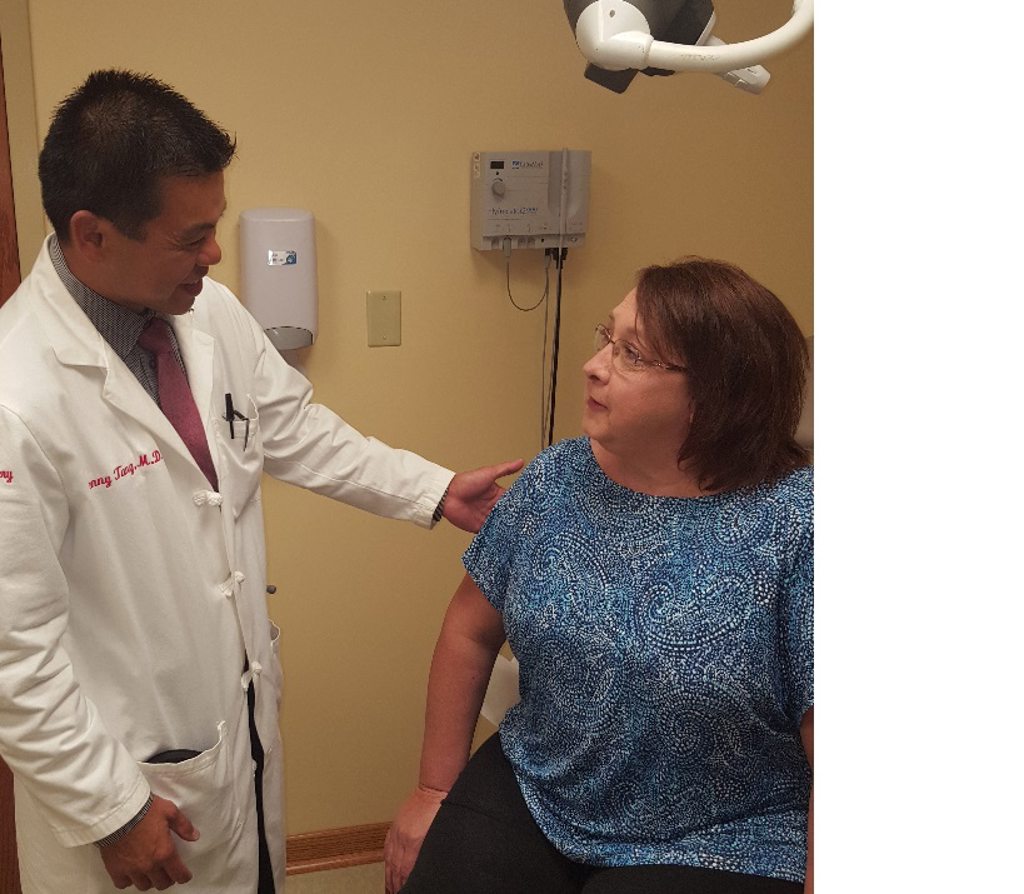
Anti-Reflux Procedure Known as the Nissen Brings Relief to Area Resident
Heartburn is a common ailment, and often people treat it on their own, never discuss it with their doctor and go on to live completely normal, healthy lives. However, heartburn can be a serious problem if left untreated, and it’s important to recognize when this issue has gone from an occasional problem to an ever-present nuisance.
The National Institute of Diabetes and Digestive and Kidney Diseases reports that nearly 20 percent of adults suffer from chronic heartburn and acid reflux. Persistent and severe reflux is a leading risk factor for esophageal cancer.
After years of self-medicating chronic heartburn and nearly a year of suffering from difficulty swallowing, Cansas Meckley of Punxsutawney decided it was time to talk to her doctor. “I didn’t realize it could do such damage,” Meckley said of her heartburn. “My doctor sent me to a gastroenterologist right away. From there, I had a lot of testing done, including a barium swallow test and several scopes.”
The scopes Meckley spoke of, were a procedure called an esophagogastroduodenoscopy, or EGD. An EGD allows the doctor to examine the lining of the esophagus, stomach and duodenum, or the first part of the small intestine just beyond the stomach. For Meckley, the EGD also included biopsies of the growths found in her esophagus. The heartburn that she had been feeling was a result of acid reflux that had caused an inflammation known as esophagitis.
“I was really worried about cancer at that point. I had known an individual who had similar issues and he just waited too long to address them. By the time he did, they found cancer. I was very concerned and wanted to address this as quickly as possible,” Meckley said.
Meckley was prescribed medication to help, but it just wasn’t working. After months of no progress or improvement, Meckley was referred to Dr. Denny Tang, general and colorectal surgeon at Penn Highlands Brookville.
Tang knew right away that Meckley was a candidate for a procedure called a Nissen Fundoplication. “The Nissen is an anti-reflux procedure that has been around since the 1950s,” he said. “The availability of medications caused a lot of people to forget that there are surgical options, as well. It’s important for patients to realize that they don’t have to live with this issue, and they certainly don’t have to rely on medication for the rest of their lives.”
“Many people don’t want to take medicine, perhaps because they have trouble remembering to take it or because they aren’t effectively helped by it,” Tang said.
As an anti-reflux procedure, the Nissen is effective in aiding those with chronic heartburn as well as the non-typical symptoms of reflux such as voice hoarseness, asthma, atypical chest pain and difficulty swallowing. This procedure can be done laparoscopically using 4-5 incisions. The surgeon uses the stomach to wrap around the esophagus, essentially creating a turtleneck around it, according to Tang. This wrap will prevent the acid inside of the stomach from moving up the esophagus.
“Because of the high success rate of this procedure, most patients will notice a difference in their symptoms within the first 24-48 hours after having the surgery,” he said. “They are able to stop taking their reflux meds right away.”
This was the case for Meckley, who underwent a Nissen on Aug.13 at PH Brookville. “My stomach was sore when I woke up from the surgery,” she said. “But I wasn’t in any serious pain. I noticed an immediate relief from the heartburn.”
As for recovery from the procedure, Tang noted that patients are initially placed on a liquid diet. After a week, they can introduce soft foods. Additionally, they are advised to wait at least a month before lifting or straining.
“In most cases, patients are able to return to work in about a week, as long as they aren’t required to lift,” Tang said.
After four weeks of recovering, Meckley returned to Tang for a follow up appointment. “I haven’t had heartburn since before the surgery and it’s been amazing to finally enjoy a full night of sleep!” she said. “I know that I will have to have another scope done after six months or so to make sure that the esophagitis is all gone, but I really feel good.”
Tang’s advice at this point? “Slowly begin introducing regular foods into your diet. Be sure to take small bites and chew them well. Continue to take care of the incision areas and allow them to fully heal. This means that if you have to lift or strain, be sure to breathe. Holding your breath can put added pressure on those areas,” he said.
As for Meckley, she is looking forward to returning to work and enjoying a good cheeseburger. “It’s been a long time since I’ve really been able to eat food like that,” she said. “Between the fear of choking and the heartburn, it was getting really difficult to enjoy a lot of food.”
“I would encourage anyone dealing with similar issues to seek help. Don’t wait too long to talk to your doctor,” Meckley said. “It isn’t worth the risk of cancer to wait.”
If you or someone you know suffers from chronic heartburn or has particular difficulty swallowing, contact your doctor to discuss your treatment options. As for surgical options, Tang pointed out that a physician referral is not always needed to see him for an appointment. For scheduling or additional questions, call his office at 814-849-1382.
To learn more about general surgery at Penn Highlands Healthcare, visit www.phhealthcare.org/surgery.

